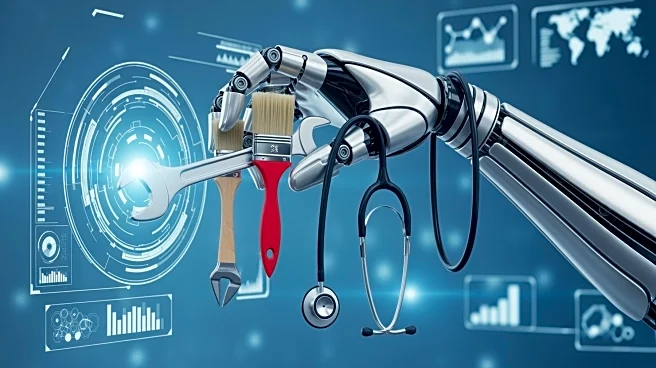What's Happening?
The rise of AI technology, particularly chatbots and large language models, is causing concern over the phenomenon known as 'de-skilling.' This term refers to the loss of skills due to reliance on technology, which
is becoming increasingly prevalent in various fields. For example, students using AI to summarize literature may not develop critical thinking skills, and doctors relying on AI for medical procedures may lose their ability to perform tasks unaided. The article discusses historical instances of de-skilling, such as the transition from manual to computerized control in pulp mills and the shift from playing music to listening to recordings. The concern is that while technology can enhance performance, it may also lead to a loss of individual virtuosity and identity.
Why It's Important?
The implications of de-skilling are significant for U.S. industries and society. As AI becomes more integrated into daily life, there is a risk that essential skills may erode, affecting the workforce's competence and adaptability. This could lead to a reliance on technology that diminishes human judgment and creativity. In the medical field, for instance, while AI can improve detection rates, it may also reduce doctors' ability to perform without technological assistance. The broader impact includes potential changes in education, where AI could alter traditional learning methods, and in workplaces, where automation might shift the focus from skill development to machine supervision.
What's Next?
The future of de-skilling will likely involve balancing the benefits of AI with the need to maintain human skills. Educational institutions may need to adapt their teaching methods to ensure students develop critical thinking and problem-solving abilities alongside technological proficiency. In professional settings, regular training and drills could help maintain essential skills, ensuring that workers remain capable even when technology fails. The challenge will be to integrate AI in a way that enhances human capabilities without diminishing them.
Beyond the Headlines
The ethical and cultural dimensions of de-skilling are profound. As technology reshapes how people work and learn, there is a risk of losing the tacit knowledge that underpins human creativity and empathy. This could lead to a society where individuals are less engaged and more reliant on technology for decision-making. The long-term shift may redefine what it means to be skilled, with new crafts emerging alongside technological advancements.











